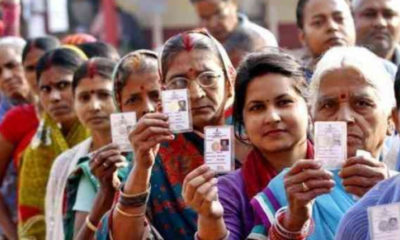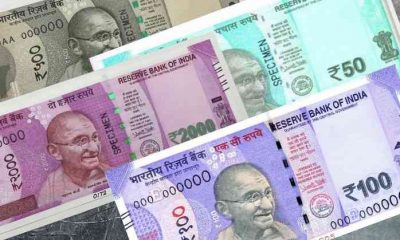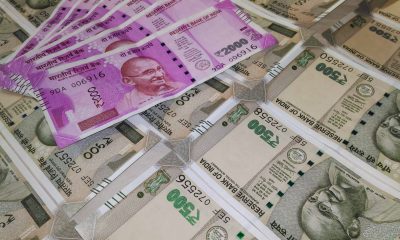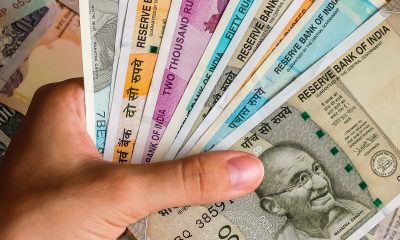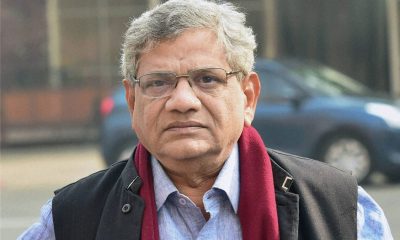National
Demonetisation enabled the push towards a digital economy: NITI Aayog CEO
 Japiur: Within three years, cash machines in India will be completely irrelevant. This bold prediction of NITI Aayog CEO Amitabh Kant was greeted with a mixture of enthusiasm and scepticism by the audience at a session here at Jaipur Literature Festival.”We’re in the middle of a major disruption,” said Kant. “At the moment, 85 per cent of transactions are in cash, which creates more opportunities for black money. But we have seen extraordinary growth in mobile phones, meaning the infrastructure for a cashless economy is there.”Aruna Sunderarajan, newly-appointed secretary of the Ministry of Information and Technology, said: “Once the four big telcos swing behind digital banking, which will happen next year, the cashless economy will grow exponentially. Look at the example of Kenya — it’s less banked and less advanced technologically, yet 50-60 per cent of financial transactions happen on phones.”
Japiur: Within three years, cash machines in India will be completely irrelevant. This bold prediction of NITI Aayog CEO Amitabh Kant was greeted with a mixture of enthusiasm and scepticism by the audience at a session here at Jaipur Literature Festival.”We’re in the middle of a major disruption,” said Kant. “At the moment, 85 per cent of transactions are in cash, which creates more opportunities for black money. But we have seen extraordinary growth in mobile phones, meaning the infrastructure for a cashless economy is there.”Aruna Sunderarajan, newly-appointed secretary of the Ministry of Information and Technology, said: “Once the four big telcos swing behind digital banking, which will happen next year, the cashless economy will grow exponentially. Look at the example of Kenya — it’s less banked and less advanced technologically, yet 50-60 per cent of financial transactions happen on phones.”
Mihir Sharma, opinion editor of the Business Standard, was more sceptical. “It’s true that mobile phone usage has grown exponentially, but that was because landlines didn’t work. The government took the wrong lesson from this. It never forced people to use mobile phones. Government got out of the way; it let people choose to use them. It happened naturally, not by government pushing it. That’s how to leapfrog forward technologically.”Ashok Wadhwa, banker and CEO of Ambit Holdings, was also sceptical about the pace of transition to a cashless economy. “No question that’s the destination, but things don’t always happen that quickly in India. It took a decade to open up the stock market in the 1990s. I personally think the transition to a cashless economy will also take longer.”
Moderator John Elliott, author of several books on India, also seemed sceptical. “I can’t even get internet in central Jaipur. How is this going to happen in three years?”Kant retorted: “It will happen because technology will make it so easy; even you can use it, John.” Sharma interjected: “If it was so easy to use, why did the government have to take away 85 per cent of all cash? Was the shock of demonetisation really necessary? “It enabled the push towards a digital economy in a much quicker way,” argued Kant. “Disruptive policies have been responsible for rapid change before in India”, agreed Wadhwa. “But we need to get the right internet infrastructure in place. And we need to remove the bureaucratic paperwork for people to set up new accounts.”
Is the cash economy really so dirty, asked an audience member. “India has a $2 trillion economy, and a $1 trillion black economy,” said Kant. “If you want it to become a $10 trillion economy, you need to smash the black economy. Around 98 per cent of Indians don’t pay tax. That restricts India’s ability to grow.”The session ended with a poll of the audience — did they think the digital economy had harmed the bricks-and-mortar businesses in India? The final result: 57 per cent thought it had.
National
Foodman Vishal Singh Honored for Hunger Free World Mission in Bangkok

Lucknow: Vishal Singh, a renowned social worker from Lucknow, also known as Foodman, has once again made India proud. He was honored by the Happy Hands Gloves Cooperative Limited Company in Korathai, Thailand, for his work with the Hunger Free World Mission.
The Hunger Free World Mission’s meeting was held in Korathai, Thailand, under Vishal Singh’s leadership. Representatives from several countries, including Mr. Raja Dwivedi (Managing Director of Happy Hands Gloves Limited), Thailand Coordinator Mr. Raja Mishra, and member Mr. Varun Singh, attended the event.

Under Vishal Singh’s leadership, the attendees took a pledge to work together toward creating a hunger-free world.
Speaking on the occasion, Vishal Singh explained that the main goal of the Hunger Free World Mission is social participation. He said the mission is not just about feeding people but also about meeting other basic needs of those who are struggling. The mission focuses on helping families of terminally ill patients in hospitals by providing food and shelter. It also works to fulfill essential needs like education, jobs, and care for the elderly.
For the last 16 years, the Vijay Sri Foundation has been providing free services, benefiting thousands of people. Vishal Singh highlighted that the mission aims to gain global recognition like other organizations such as WHO, WWF, and Red Cross, which work for social causes.
During this meeting, Vishal Singh was appointed as the Chairman of the Hunger Free World Mission by representatives from various countries. They also discussed holding regular meetings in different countries to push the mission forward.
Business tycoon Dr. Abhishek Verma has also supported this humanitarian mission, vowing to promote the idea of “Seva Parmo Dharma” (Service is the highest duty) worldwide. Vishal Singh praised him, stating that people like Dr .Abhishek Verma inspire others to work for the betterment of society.
Recently, Romania’s Ambassador, Mr . Daniela Sezonov Ţane, invited Vishal Singh to the Romanian Embassy in Delhi, where they discussed the mission in detail. Impressed by his humanitarian work, she honored Vishal Singh and invited him to Romania to take the mission forward .
Food man Vishal Singh has been serving the people of India for the past 16 years. Through the Vijay Sri Foundation, he provides free meals to cancer patients & their families ,shelter, and education for women & children along with running free old-age homes in Lucknow.
In addition to his humanitarian work, Vishal Singh also addresses issues like crime and corruption through his role as Chairman of Seva Path Media and Managing Director of Vijay Sri Foundation.

During the COVID-19 pandemic, Vishal Singh and his team worked tirelessly to provide food and help to the needy, including starving children, elderly citizens, and pregnant women. Despite contracting the virus himself, he continued to assist others after his recovery. He even created a life-saving oxygen regulator using household items, which was praised by doctors both in India and abroad.
In his address at the meeting, Vishal Singh spoke about his mission to create a hunger-free world. He pointed out that India’s large population, along with issues like unemployment and poverty, has caused the country to fall on the Hunger Index. He urged people to contribute just one handful of grains daily to help create a hunger-free world.
He concluded by saying that through social participation, we can empower the people around us, meet their basic needs, and work together to build a stronger, more prosperous, and developed society.


